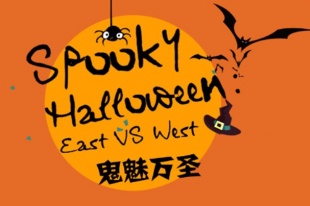Spooky Halloween: East meets West

 |
Children dress up for the Halloween at a kindergarten in Handan city, Hebei province, Oct 30, 2017. {Photo by Hao Qunying/Asianewsphoto] |
'Made in China'
Halloween season means big business for some companies in China.
Months before the Halloween, the workers in Shenyang Chuangqi Amusement Equipment Co. Ltd. have been working to produce as many props and costumes as possible to sell to the world. The company is well-known for entertainment equipment manufacturing, and its products are exported to the US, Southeast Asia and Europe.
Another go-to place for retailers is Yiwu, the world's largest small commodities market where retailers from all over the world go to refuel. The small town supplies 80 percent of the world's Halloween/Christmas decorations and 60 percent of children's toys.
A 2016 report showed that 61.9 percent of Americans have plans for celebration, according to a website dedicated to cross-border commerce. Aside from handing out candies (70.9 percent), home/yard decorations and costumes top the celebration plans with 48.6 percent and 47.1 percent respectively, among other activities.
Stats show that 171 million Americans spent an average of $82.93 per person in the Halloween of 2016, compared to $74.34 per person in 2015. The number is expected to climb higher this year, which means huge potential in cross-border commerce for some Chinese companies.
"Why the fuss?"
Yiwu's output is not just for Western party-goers. The festival has seemingly received wider acceptance among the Chinese, kids especially. Parents were asked to prepare costumes and carve pumpkin lanterns for their children and attend the celebratory activities in school.
While some treat it as a bonding moment between parents and children, others went on Weibo, China's Twitter-like service, to complain that it has gone too far.
"To be honest, I don't understand. Why the fuss about the Halloween? The kindergartens and other learning centers are holding various activities to celebrate. But why do few people talk about the Chongyang Festival (a day to pay respects to senior citizens)? Shouldn't we be promoting the traditional festivals to the younger generation?" asked @rLittleWhitey.
"Actually, I'm kind of repulsed that kindergartens nowadays treat the Halloween as a super grand festival," @LadyTracy echoed.
The debate on celebrating Western festivals, such as Halloween and Christmas, has been going on for years. In the "Two Sessions" earlier this year, Zhu Jun, a well-known anchor from China Central Television (CCTV), proposed to ban such holidays in schools and kindergartens. But the proposal didn't result in any practical actions from either the state or provincial-level.
Experts say the popularization of Western holidays is partly due to globalization. Another reason is that young Chinese thought that those festivals are more entertaining.
Also, Chinese people celebrate Western festivals just to socialize and party, not knowing the real meaning behind the tradition, said Xiao Fang, a professor at the Beijing Normal University.
He also suggested that traditional Chinese festivals should be celebrated in more interesting ways to attract more children and teens.
Instead of treating Western festivals as cultural erosion, the bigger question is how to keep the traditional culture live and shine amid the fast-globalizing world.
Related: Different shades of Western and Chinese 'ghost festivals'





































